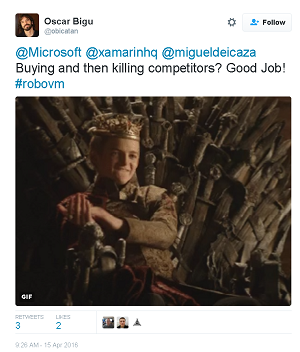News
Swallowed Twice, Mobile App Firm RoboVM Calls It Quits
- By David Ramel
- April 15, 2016
Bought by Xamarin, which was then bought by Microsoft, RoboVM called it quits today. The company let developers build native iOS and Android mobile apps with Java.
The move was predicted by an ADTmag reader with the handle Dalvik some two months ago in a comment to an article about React Native support not coming to Visual Studio 2015. The prescient Dalvik wrote:
I doubt they would keep RoboVM, it has a niche following lagging way behind the competition in the Java space. Xamarin probably bought them mostly as a play for Oracle to help them boost the sale price to Microsoft.
Notice that usually after such purchases companies make announcements regarding the technologies they will keep and discard but nothing was said about RoboVM which is a completely different unit from Xamarin proper.
Dalvik called it perfectly.
"After looking at the complete landscape for mobile development with Java, the decision has been made to wind down development of RoboVM," reads today's blog post announcing the demise of the small Swedish company.
The post had a far different tone from Xamarin CEO Nat Friedman's quote when the company announced it was acquiring RoboVM last October: "If Xamarin were to build a Java solution from scratch, it would look like RoboVM because they took the same native-first approach in their design. If you love Java, you are going to love RoboVM for iOS and Android development."
The love is gone.
In late February, Microsoft announced it was buying Xamarin, which uses C# to build iOS and Android mobile apps. No mention was made of RoboVM in Microsoft's announcement.
In today's post, RoboVM CEO Henric Müller said the team had "been working with the teams at Xamarin and Microsoft to assess the technology and business conditions of RoboVM to determine the path forward for the products."
Müller said all customers can get a refund for their RoboVM licenses, which will be operable until April 30, 2017. RoboVM-based apps should continue to work unless Apple introduces breaking changes to its iOS. "Android projects and apps that you have created in RoboVM Studio can be opened and compiled in Android Studio or IntelliJ IDEA, and any cross-platform RoboPods you are using on Android and iOS should continue to work in those projects, subject to breaking changes," he said.
For apps currently under development, the guidance is:
Depending on where you are in the development of your apps, there are several options available to move forward, including tools that will help you port to Xamarin, and alternative Java SDKs which target iOS. In particular, libGDX has just announced their support for Intel's Multi-OS Engine, which means there is an alternative for the majority of RoboVM's active developers. Beyond this, Microsoft and Xamarin are very interested in enabling your success in mobile and we'd like to help you move forward. If you'd like to discuss your app development plans, please e-mail us at [email protected].
The option of continuing the technoloy as a community-led open source project is hampered in view of the company's "
closed sourcing" of its software last October. RoboVM cited no significant contributions to the project and thus no benefits derived -- and in fact accused competitors of using the open source code against the company. However, the
code still exists on GitHub, though it hasn't been updated since last November.
Today's news sparked some developer ire, with some reverting to the old Microsoft-bashing of yesteryear, before the company changed direction with an embrace of openness and interoperability. "So Xamarin buys RoboVM, then a couple of months later MS buys Xamarin and kills RoboVM," read a Hacker News comment. "Feels like the MS of the 90's is back." Tweeters also got in on the act:
 [Click on image for larger view.]
A Reaction on Twitter (source: Twitter)
[Click on image for larger view.]
A Reaction on Twitter (source: Twitter)
"RoboVM has been the most challenging, exciting and fun experience of our professional careers," today's RoboVM post concluded. "We are incredibly grateful for all the support you've shown us over the past 2 years, as contributors, users and customers."
About the Author
David Ramel is an editor and writer at Converge 360.